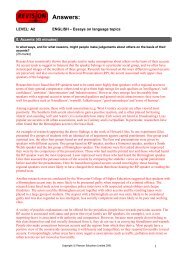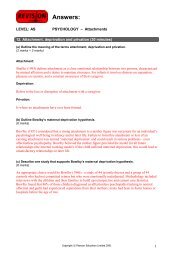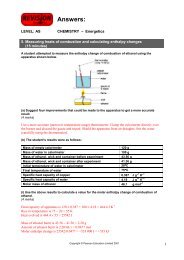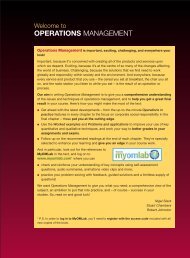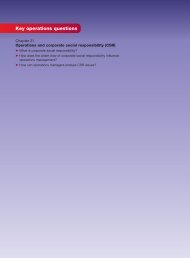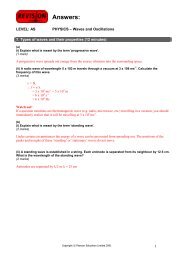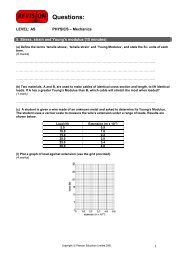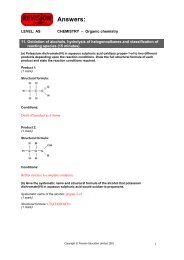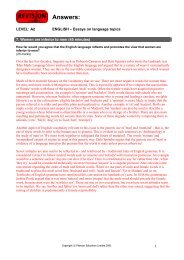The Dove Campaign for Real Beauty - Pearson
The Dove Campaign for Real Beauty - Pearson
The Dove Campaign for Real Beauty - Pearson
Create successful ePaper yourself
Turn your PDF publications into a flip-book with our unique Google optimized e-Paper software.
Company case 2 Nestlé: singled out again and againDuring the first few months, the mother’s milk willalways be the most natural nutriment, and everymother able to do so, should herself suckle herchildren.Henri Nestlé, 1869Nothing is a substitute <strong>for</strong> or equivalent or superior tobreastmilk.Nestlé warning, 2007<strong>The</strong> corporate affairs department at Nestlé UK’s headquarterswere bracing themselves <strong>for</strong> another burst ofadverse publicity. At the <strong>for</strong>thcoming General Synodof the Church of England a motion would call <strong>for</strong> acontinued ban on Nescafé by the Church. <strong>The</strong>y alsowanted the Church Commissioners to disinvest their£1.1m (€1.6m) in Nestlé. <strong>The</strong> Church’s much publicisedboycott of Nescafé first occurred, amid much ridicule,in 1991, as a protest against the use of breast milksubstitutes in Third World countries. In the aftermath ofthe 1991 vote, Nescafé claimed that its sales increased,although many churchgoers said they stopped usingthe brand-leading coffee. <strong>The</strong> new protest would beone of many the company had faced from Baby FoodAction (BFA) protesters over decades although, accordingto Nestlé, the protesters’ complaints had no foundation.Nestlé SA, whose headquarters are in Vevey,Switzerland, is the world’s largest food company, withannual sales of CHF 98.5bn (€60bn) and with a net profitof CHF 9bn (€5.4bn). It employs around 260,000 people infactories or operations in almost every country in theworld. Henri Nestlé invented manufactured baby food ‘tosave a child’s life’ and the company have been suppliersever since. <strong>The</strong>n, in the late 1970s and early 1980s,Nestlé came under heavy fire from activists who chargedthe company with encouraging Third World mothers togive up breast feeding and use a company-prepared<strong>for</strong>mula. In 1974 the British charity War on Wantpublished a pamphlet, <strong>The</strong> Baby Killer, that criticisedUnigate and Nestlé’s ill-advised marketing ef<strong>for</strong>ts inAfrica. While War on Want criticised the entire infant<strong>for</strong>mula industry, the German-based Third World ActionGroup issued a ‘translation’ of the original pamphletretitled Nestlé Kills Babies, which singled out thecompany <strong>for</strong> ‘unethical and immoral behaviour’. <strong>The</strong>pamphlets generated much publicity. Enraged atthe protest, Nestlé sued the activists <strong>for</strong> defamation.<strong>The</strong> two-year case kept media attention on the issue.‘We won the legal case, but it was a public-relationsdisaster’, commented a Nestlé executive.In 1977, two American social-interest groups, theInterfaith Center on Corporate Responsibility and theInfant Formula Action Coalition (INFACT), spearheadeda worldwide boycott against Nestlé. <strong>The</strong> campaigncontinued despite the fact that many organisationsrejected the boycott. <strong>The</strong> US United Methodist Churchconcluded that the activists were guilty of ‘substantialand sometimes gross misrepresentation’, of ‘inflammatoryrhetoric’, and of using ‘wildly exaggeratedfigures’. <strong>The</strong> boycott was called off in 1984when the activists accepted that thecompany was complying with an infant<strong>for</strong>mula marketing code adopted by theWorld Health Organization (WHO). Sincethen, church, university, local governmentand other action groups periodicallyrediscover the controversy and createpublicity by calling <strong>for</strong> a boycott.<strong>The</strong> main accusation now is thatNestlé’s use of promotions persuaded hundreds of thousandsof poverty-stricken, poorly educated mothers that<strong>for</strong>mula feeding was better <strong>for</strong> their children. ‘Every day4,000 babies die from unsafe bottle feeding’, explainBMA. <strong>The</strong>y continue, ‘Donations of infant <strong>for</strong>mula can domore harm than good.’ <strong>The</strong>ir concern is the donation offree or low-cost supplies of infant <strong>for</strong>mula to maternitywards and hospitals in developing countries. Formulafeeding is usually an unwise practice in such countriesbecause of poor living conditions and habits; peoplecannot or do not clean bottles properly and often mix<strong>for</strong>mula with impure water. Income level does not permitmany families to buy sufficient quantities of <strong>for</strong>mula. <strong>The</strong>protesters hit out at industry practices generally butkeep Nestlé as their prime target:●‘Every day 4,000babies die fromunsafe bottlefeeding’, explainBMA.Promotional baby booklets ignoring or de-emphasisingbreast feeding.121



